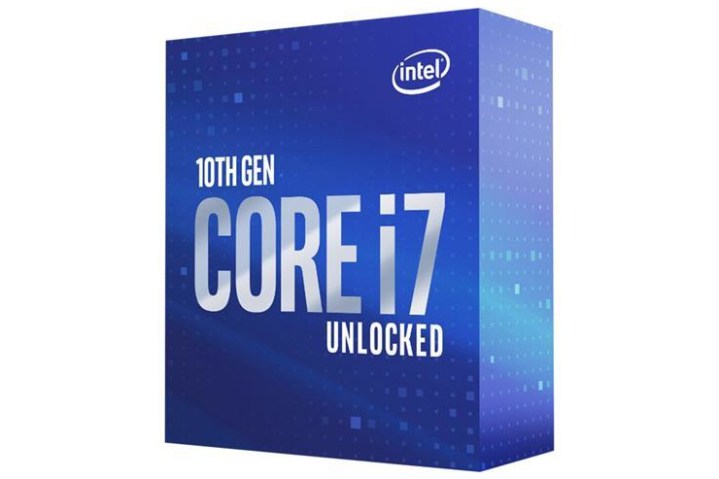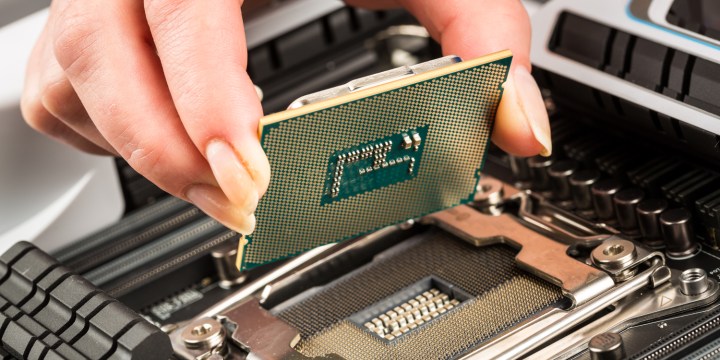The i5-10600K and i7-10700K are Intel’s most recent midrange processors, targeting high-end gaming rigs and professional workers who don’t have the budget or need for something like the i9-10900K. There are some clear differences between the two chips, though both earned a recommendation in our best Intel processor roundup. The question is, which one should you buy?
Although the more expensive i7-10700K is the better option in certain situations, the i5-10600K is a surprisingly capable CPU. Especially if you’re willing to overclock your processor, it can match the performance of the 10700K when used for gaming. For other uses, such as audio and video editing, however, the i7 still reigns supreme.
Pricing and availability

The i5-10600K and i7-10700K released alongside the rest of Intel’s Comet Lake processors on April 20, 2020. The “K” models — not the “KF” models, which have nonfunctional onboard graphics — released at an MSRP of $262 for the i5 and $374 for the i7. Those are the same prices Intel offered with its last-gen Coffee Lake Refresh chips, the i5-9600K and i7-9700K.
In late 2020, you can still find both processors at most retailers, and that shouldn’t change anytime soon. Intel is expected to unveil its 11th-gen desktop chips sometime in 2021. Details remain slim, but Intel promises much improved instructions per clock (IPC), but a maximum of eight cores only.
Until then, both processors will likely be readily available. They’re currently priced around their MSRP, with the i5 at $280, and the i7, $380.
On the second-hand market, you can save between $50 and $100. We found multiple listings for 10700Ks for between $280 and $350, though most sit around the $320 mark. We couldn’t find nearly as many secondhand 10600Ks, however. If you’re lucky, you can snag one pre-owned for around $220.
Specs and performance
Comparing the 10600K and 10700K on paper, there aren’t many surprises. Both use the same 14nm process node that Intel has been refreshing for the past six years, and only differ slightly in terms of specs. The i5 comes with six cores and 12 threads, while the i7 bumps the core count to eight with 16 threads. The i7 also comes with 4MB more of Intel’s Smart Cache, and has a higher boost clock out of the box.
| Intel Core i5 10600K | Intel Core i7 10700K | |
| Process node | 14 nm | 14 nm |
| Cores | 6 | 8 |
| Threads | 12 | 16 |
| Cache | 12MB Intel Smart Cache | 16MB Intel Smart Cache |
| Base clock speed | 4.1GHz | 3.8GHz |
| Boost clock speed | 4.8GHz | 5.1GHz |
| Graphics | UHD 630 | UHD 630 |
| TDP | 125W | 125W |
“Out of the box” is important because you can push both processors above 5GHz with adequate cooling. At stock, we can see some clear differences in performance with GeekBench results. The 10700K earned a single-core score of 1,334 and a multi-core score of 9,319, while the 10600K earned a single-core score of 1,306 and a multi-core score of 7,026. Although both results are “valid” according to GeekBench, you should always take user-generated benchmarks with some skepticism. It’s not that they’re incorrect, but rather that it’s impossible to account for cooling and other components when comparing one user’s results to another.
Single-core performance is equal, or at the very least, well within the margin of error. Multi-core performance tells a different story, however, with the more expensive i7 soaring above the i5 by around 2,000 points. There are more cores on the 10700K, and they can boost higher out of the box. For high-end gaming and photo/video editing applications, the 10700K is a clear winner.
Guru3D’s CPU-Z benchmark backs up the GeekBench results with a synthetic workload. The i7 and i5 are evenly matched in single-core performance — 571 and 551, respectively — and distant in multi-core performance (5,747 and 4,055, respectively).
In real-world testing, the 10700K beats the 10600K in heavily threaded applications, too. Ashes of the Singularity, for example, takes advantage of all the cores and threads of the 10700K. At 1080p with the Crazy preset, the 10700K reaches an average framerate of 55.6 FPS while the 10600K reaches 50.2 FPS, according to third-party benchmarks. That’s not the case in all games, however. In Final Fantasy XV, the 10600K actually beat the 10700K 175 FPS to 173.9 FPS.

In games that rely heavily on the CPU — such as Grand Theft Auto V, Hitman 2, and Civilization VI — the i7 is a clear favorite. However, most games are GPU bound, not CPU bound. As we can see in Final Fantasy XV, the 10600K easily matches the more expensive 10700K, and you’ll likely see similar results in games that stress the GPU more than the CPU. If gaming is what you’re interested in, save yourself the extra $100 and put it toward a good graphics card.
If you are a dab hand at overclocking, the 10600K has been known to nip at the heels of the much more expensive 10900K with the right cooling.
The multi-core performance advantage of the 10700K shows up more when it comes to productivity apps. Video editing applications like Premiere both like a lot of cores, so video editors will get more out of the 10700K. If you do 3D modeling or CAD work, the 10700K is a must (you might even consider upgrading to the 10900K).
i5 or i7?

Historically, Intel has unlocked i5 and i7 processors of any particular generation battle for the limelight, and that’s no different with Comet Lake. The i3s are usually slow enough to be focused entirely on low-power systems, and the i9-10900K, although very impressive, is expensive. For Comet Lake, the 10600K and 10700K are both excellent processors at competitive prices, but the one you should pick up depends on what you want to do.
If you’re building a PC exclusively for gaming, the 10600K is the better option, even if the 10700K performs better in certain titles. However, you can close that gap if you’re willing to do some manual overclocking. The 10600K can easily hit 5GHz, and although it may not match the performance of the 10700K in all games with an overclock, it will get close.
The 10700K will show a performance improvement in certain applications, namely photo and video editing suites and 3D modeling software. Simply put, the 10700K has more cores and threads, so in applications that can take advantage of those cores, you’ll see higher performance.



